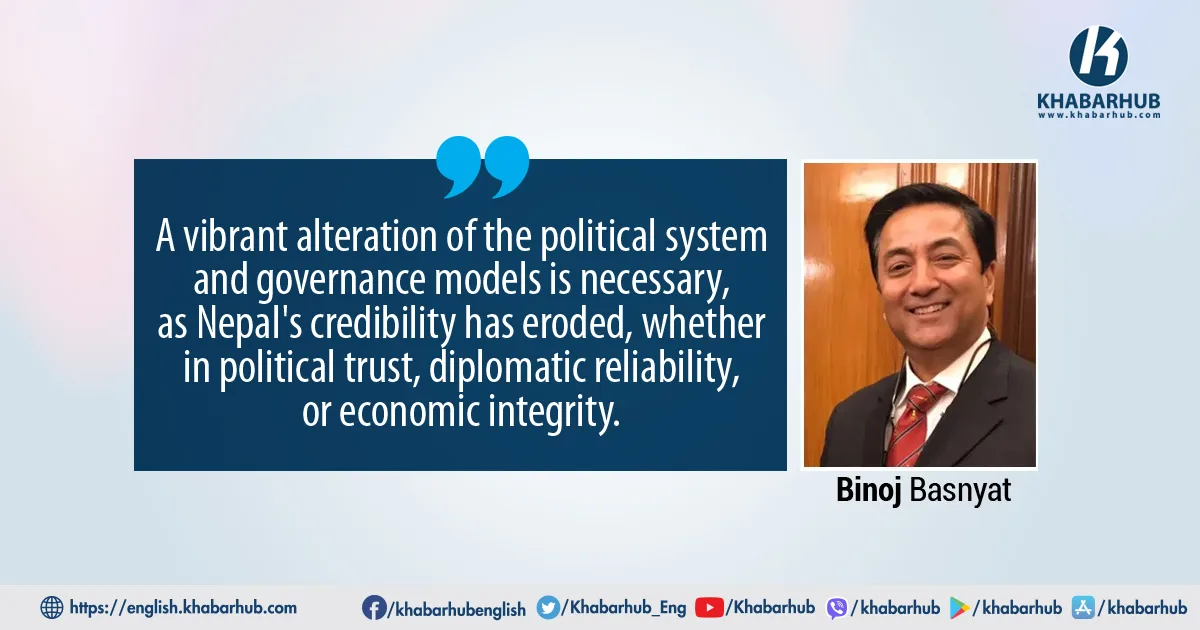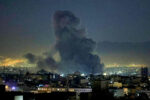Over nearly two decades, Nepal has dealt with four major strategic issues that gave way to the implementation of a new political order in the Himalayan nation following the signing of the Comprehensive Peace Agreement (CPA) in 2006:
1. Realignment of the insurgency into Nepal’s existing democratic process through ‘Peace Talks.’
2. The integration and rehabilitation of the Maoist combatants.
3. The reconciliation of human rights issues related to over 60,000 cases.
4. The promulgation of the 2015 Constitution based on the principles of federalism, republicanism, secularism, and inclusivity.
Amongst these, two fundamental issues continue to be a matter of debate and discussion. Affairs of ‘Human Rights’ management after the decade long war led by the Maoists is a well-known ongoing and unending process.
However, with new 15 July coalition government’s possible two third reach in the federal parliament, the ‘2015 Constitution’ has come back into the spotlight with the potential to change.
Throughout this 18-year transition, geopolitical forces have remained front row influencers.
Now both the constitution and political forces behind it will be closely knitted to geopolitical affairs as much as to national issues while further investigating the Human Rights issues and the 2015 Constitution as Nepal continues to deal with the ongoing prolonged transition to its new political system and governance system.
The fourth time PM in a year and a half of premiership with different coalition partners ended with a stern warning to the constitutional forces for an amendment in the constitution.
The new, Nepali Congress (NC) and Nepal Communist Party, United Marxist Leninist (UML) led government has floored two agendas for their ruling coalition.
One, find a way out of political instability, and second, explore any required changes in the 2015 Constitution that ought to be better in the light of the eight years of practiced implementation.
This will be a part of Nepal’s search for a strong national government administration for economic growth, and also a part of what we may call the making of “A Nepali defined political and governance system”.
It seems that the major political force figurehead during the start of Nepal’s transition in 2006- recently ousted Prime Minister Prachanda, (the leader of the Nepal Communist Party Maoists Centre (NCPMC) and the Maoist war), has not been able to uphold the people’s confidence.
This is reflected amidst the four general elections and the numerical counts in the four times vote-of-confidence in the parliament in just a year and a half.
After departing from a proletariat communist state and entry into peaceful politics in 2006, the Maoists under Prachanda’s leadership had won 229 of 601 as the largest force in the April 2008’s first Constituent Assembly (CA) election.
The party landed as the third largest in the November 2013 second CA election with 82 seats of 601. Following the promulgation of the Constitution, the Maoists landed as the third largest party in both 2017 and 2022 general election with 53 with an electoral alliance with UML and 32 seats with an electoral alliance with NC out of 275 respectively.
The NC and UML have been maintaining while Rastriya Prajatantra Party (RPP), Rastriya Swatantra Party (RSP) and Independent candidates have been substituting the loss of NCPMC.
With the Madhesh movement the Madhesi Jana Adhikar Forum, Nepal (MJFN), or the Madhesi People’s Rights Forum, Nepal entered main stream politics which disintegrated into several groups in the following elections.
In 2023, Prachanda led two coalition governments, both with the largest party NC, and again in 2024, a flip-over to the second largest party, the UML. He was termed as a king maker although was the third political force in the parliament.
Prachanda’s anxiety however could be seen as hitting a no option zone, as many speculated and could be assumed as, one, the Human Right backlash that the party leaders of the insurgency have to bear, and second, the loosing political-philosophy mindset of his party, and lastly, related to personal financial gains as a part of using money to influence his declining political space.
In June 12, 2024, in an attempt to securing a fourth vote of confidence in only a year and a half, against the latest NC and UML coalition, Prachanda seems to have lost more than just the position of head of the government.
The competition amongst the constitutional forces NC, UML and RPP with the constituted forces NCPMC and the Madhesi based parties MJFN and the new Constituted force RSP and Independent candidates in the local bodies is continuing with indications of people’s loss of trust.
The constitutional forces have maintained the count on, while the constituted forces have disoriented assurance and the new constituted forces is being assessed.
National needs and national priorities are marginalised by leadership’s greed and fear led national policies, self-centeredness, misreading geopolitical surroundings in addition inter and intra party inconsistencies. The dangerous push for constitutional normalisation without a real path or deal will destabilise Nepal and spill over effect in the region particularly India.
Geopolitical Consideration
Ministry of External Affairs, New Delhi on 20 September 2015 in a press statement supported the republicanism, federalism and secularism. “We note the promulgation in Nepal today of a constitution”. Inclusivity was where the constitution missed.
New Delhi had in a strongly worded statement said it was “concerned that the situation in several parts of the country bordering India continues to be violent”.
In contrast, the northern neighbour Chinese foreign ministry spokesperson Hong Lei in a statement said, “China sincerely congratulates Nepal on promulgating the new constitution”.
“It is hoped that Nepal will seize the opportunity to realise national unity, stability and development,” he said at a regular press briefing on Monday.
Hong said China would continue providing economic support to Nepal. In recent years, China has become the biggest source of foreign direct investment, overtaking India.
“China values its relations with Nepal,” he said, “and is willing to further deepen mutually beneficial cooperation, and provide assistance to economic and social development of Nepal as our capacity allows.”
The EU Bruxelles spokesperson supported the constitution as a historic event for future political stability and economic development while expressing concern of the unrest with loss of lives in Madhesh. European Union expects all parties to come together to address the outstanding concerns of all its citizens.
The change in coalition government and the main two NC and UML constitutional forces coming as an alliance to form a national government expresses constitutional drawbacks with political instability, institutionalisation of corruption, politicisation of institution, disorientation of national foreign policy besides other tribulations.
Nepal’s needs effectual diplomacy to succeed in great power politics due to the geostrategic placement, particularly with regards to Tibet of China.
China and India immediate neighbours account for nearly half of the world’s economic growth, which is reshaping South Asia intended for putting together international order.
Political Concern
NCPMC began their political journey with ethnic politics. There was substantial representation for the first time in Nepali history with Dalits receiving 8.17 percent of seats, women 33.22 percent, ethnic and indigenous people 33.39 percent and Madhesi 34.09 percent in the first CA election of April 2008.
NCPMC formed in 1994 as United Communist Party of Nepal (Maoists) has gone through a number of radical transformations with starting of the people’s war in 1996 to a democratic force in politics.
The fourth time PM in a year and a half of premiership with different coalition partners ended with a stern warning to the constitutional forces for an amendment in the constitution.
“I am concerned this might lead to regression and authoritarianism,” said Dahal. Prachanda was quick to acknowledge the mistake and refrain from ultimatums and provocative comments while making controversial remarks while addressing the parliament, he pledged to exercise greater caution while expressing personal emotions. The exit may be an end of NCPMC power politics. Oli is the 14th PM but 17th Head of Government in 16 years after 2008.
The fourth inning of Oli has got daunting tasks for political stability through amendment of the constitutions, economic modifications, social challenges, politicisations of governance system, revolution in agriculture, revisit foreign policy in the geopolitical shifts, formation of a national government above all homecoming of national credibility.
The political system change to federalism, republicanism and secularism did not gain recognition solely due to the Maoists hostilities but transpired with the New Delhi orchestrated fusion of the seven-party alliance and the Maoists.
When India was the sole influencer in several political shifts in Nepal, the West particularly the European nations had evenly balanced determination in the peace process and the change in the political system. It was for peace and stability through inclusiveness.
Accountability as the means to proficient performance. Accountability is critical for meeting deadlines, hitting targets, and growing revenues. It’s about fostering a mindset that encourages growth and trust, not assigning blame.
The 2015 constitution that attempted to address key issues, embracing marginalisation and inclusion, federalism, gender equality and citizenship came with varied responses. The overlooking components were the issues of citizenship criteria, specific provisions for local and substantial governance and particularly the delineation of provincial boundaries.
Way Forward
The change in coalition government and the main two NC and UML constitutional forces coming as an alliance to form a national government expresses constitutional drawbacks with political instability, institutionalisation of corruption, politicisation of institution, disorientation of national foreign policy besides other tribulations.
China supported the 2015 constitution while India and the European Union (EU) supported the spirit but expressed concern of inclusiveness with the loss of 57 lives particularly in the Terai and other parts of the country amongst amid Madhesi and Tharus.
There is disagreement over boundaries of new states, electoral representation and affirmative action, constituency delineation and citizenship-related clauses.
Two issues, the constitution amendment and Human Rights acquires to precede the forming national government to address precise inclusivity, national identity, economic expansion by looking into the political system and governance model while also attending civil liberties.
How do you deal with the changing world order is a fundamental question when internal political-economic-security-social- diplomatic is in disorder?
How Nepal has worked over the last 255 years needs to be evaluated together with what has been brought about post CPA. National needs have obsolete from national policies.
The challenge of a more geopolitically turbulent region and the world comes as Nepal’s political and economic models is revealing clues of stress.
Gross Domestic Product growth has lagged but foreign currency is maintained with more than eight million migrant workers with no economic opportunities at home.
The lack of well-performing political and financial system, inadequate macroeconomic policies, imperfect strategic structures, underdeveloped technical preferences have all meant immoral growth.
The opportunities lie as, addressing institutional corruption through method of prevention and punishment.
Accountability as the means to proficient performance. Accountability is critical for meeting deadlines, hitting targets, and growing revenues. It’s about fostering a mindset that encourages growth and trust, not assigning blame.
The shift to more antagonistic, security-driven political and economic relations will not be trouble-free but political will and constructive diplomacy is the response when Nepal is in search for a national government for economic development and in the making of Nepali defined political and governance system.
Secondly, professionalisation of institutions through meritocracy, pragmatism and honesty. Principal and model brought together for what Singapore is today.
Thirdly, but vibrant is an alteration of political system and governance models so that Nepal lost credibility weather it is political trust, diplomatic reliability, economic integrity folds back in the arms of the mighty Himalayas.
Fourth is revisiting foreign policy to address the 21st century challenge when US and the West is pivoting to the Indo-Pacific Region and China and India are finding political and economic space through North-South cooperation and South-South cooperation.
Non-Alignment Movement (NAM) will subside to be influential bloc as in the Cold War. Nepal’s diplomatic search should spearhead with preference to ‘Global Environment’ as well as exhibit a model to lead the 14 countries bordering China with either a ‘region/country of peace’ or ‘Active Non-Alignment Policy’ with support from powers upholding democratic values.
Lastly, it is about rebuilding trust with all social groups their cultural and religious practices. Two, refraining from arbitrary protest strategies, provocative speech and violence. Third, maintain an open approach to all contestants that is represented in the parliament.
The shift to more antagonistic, security-driven political and economic relations will not be trouble-free but political will and constructive diplomacy is the response when Nepal is in search for a national government for economic development and in the making of Nepali defined political and governance system.
There are various ways geopolitics work, but in international politics there are no permanent friends or enemies, only permanent interests.
(The author is a Strategic Analyst, Major General (Retd) of the Nepali Army, and is associated with Rangsit University, Thailand)
(The author is a Strategic Analyst, Major General (Retd) of the Nepali Army, and is associated with Rangsit University, Thailand.)
(Views expressed in this opinion are the writer’s and do not necessarily reflect the editorial stance of Khabarhub)









Comment